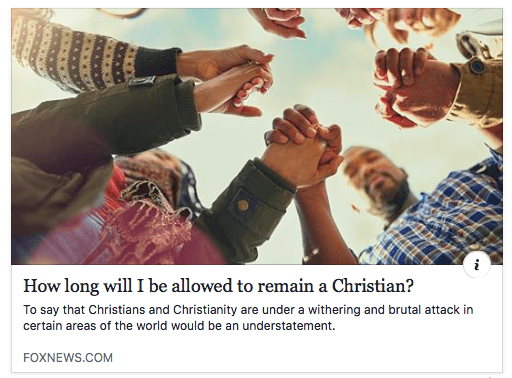
Oddly enough, when this Fox News article popped up in my Facebook I saw the title and thought it was written by a liberal Christian with progressive views, feeling forced out of Christianity by conservative Christians. There has been a lot of talk over the last two years, after all, about what evangelicalism and even Christianity mean, in the age of Trump—about who controls the image and does the gatekeeping. But no, that is not what this article was about at all.
It’s about all the ways American Christians are persecuted.
“How long will I be allowed to remain a Christian?”
That was the deeply dismaying question posed to me by a friend with four young children as we discussed the plight of the Christian faith in America and around the world.
With each passing month, that shocking question becomes more relevant and even more disturbing.
To say that Christians and Christianity are under a withering and brutal attack in certain areas of the world would be an understatement.
In various parts of the Middle East, there is a genocidal cleansing of Christians being carried out. Women, men, and their young children are being slaughtered because of their faith and world leaders and most of the media turn their backs in bored indifference.
Yes, there are areas of the world where Christians are facing religious persecution—but they are not alone in that. In parts of India, Muslims face religious persecution at the hands of Hindus. ISIS targeted Yazidis. Muslims are attacked by Christian militias in the Central African Republic.
I don’t have a problem with Christians talking about the persecution they face. But as a child, growing up in an evangelical home, I ended up with the impression that Christians were uniquely persecuted. This is not the case. Fixing these problems will require a larger focus on defusing religious hatred of all sorts (and on the relationship between culture and religion).
But the author of this piece, Douglas MacKinnon, does not stop there.
Here in the United States, Christians and Christianity are mocked, belittled, smeared and attacked by some on a daily basis. This is a bigoted practice that is not only increasing exponentially, but is being encouraged and sanctioned by a number on the left.
Too many of those who worship at the altar of political correctness have deemed that Christianity should no longer be respected. Rather, they assail it on a regular basis in a coordinated campaign to weaken the faith and its base.
And there it is: Christian persecution in the U.S.
Can we define “respect”? What is it MacKinnon wants? A society that has de jure or de facto blasphemy laws? Can we also talk about what constitutes persecution? Sure, mocking and belittling can play a role in persecution. Consider the role these things have historically played in the persecution of LGBTQ communities in the U.S. But persecution against LGBTQ communities was what it was because it did not just involve mockery—it involved the threat of violence, and the law.
Some of this is also a fundamental misunderstanding of comedy and what it is. Comedy has often been about lampooning those who are in power. In fact, that is arguably comedy at its best. To a certain extent, such comedy reflects the continued dominance (yes, dominance) of Christianity in American culture. (I realize that MacKinnon is not talking only about comedy shows lampooning Christianity; however, I felt this was worth addressing because that often is what is brought up.)
The prevailing view in much of the media is that Christianity is aligned with Republicans, conservatives, or the views of President Trump – and therefore must be diminished and made suspect.
Um. Hmm. Whyever might that be the case?
The New Yorker just described the opening of a few Chick-fil-A restaurants in New York City as “Pervasive Christian traditionalism,” and a “Creepy infiltration of New York City.”
Christianity is an “infiltration” to some on the left.
I’ll admit that New Yorker piece was a bit odd (something even atheists noted at the time). But MacKinnon is drawing a lot from a single article—and he’s also making an awfully big assumption.
The anti-gay evangelical Christianity Chick-fil-A represents is not identical to the whole of Christianity. Throughout his article, MacKinnon uses the term “Christianity” when what he really means is “evangelical.”
In college, they now teach about the evils of “Christian Privilege.”
That is a fundamental misunderstanding of what privilege is. Privilege just is. Having privilege does not make a person evil. Recognizing that privilege exists does not mean believing that Christians are evil (or that Christianity is).
Christian privilege is not that hard to understand, either. On the simplest level, Christians’ religious holidays are officially observed as holidays, with time off work (calling it “winter break” does not erase the fact that this break is oddly intentional about circumscribing December 25th). That is not the case for other religious’ holidays.
On Broadway and in theaters around the world, mocking Christians has become a massively profitable money-making venture.
In name, on the crucifix, and in art, Jesus Christ is desecrated in the most twisted and obscene of ways. In movies, on television and online, Christians are portrayed in the most dishonest, prejudiced and insulting of ways.
An awful lot has been made of specific acts of art in the past that involved the desecration of Christian religious symbols. I very much suspect that if you looked at the actual reception of such art, you would find that most people disapproved of it. Is such art allowed? Of course! Again, what does MacKinnon want—blasphemy laws? But this sort of art gets very overplayed—especially considering how much art in the U.S. (including music) still centers on Christian themes.
Across the country, Christian colleges are under constant assault from “social justice warriors” seeking to strip their accreditation and put them out of business.
Just so we’re clear, the issue is Christian colleges’ desire to discriminate against LGBTQ individuals. Should accrediting agencies require colleges not to discriminate? That seems to be the question—that and, should the government provide financial aid for students attending colleges that discriminate. By skipping the root of the disagreement here, MacKinnon makes it sound like activists are trying to shut down Christian colleges because they hate Christianity. Nope.
Christian groups on campus are at times being persecuted, their offices and handouts vandalized, with members even being physically assaulted.
So guess what? During the half a dozen years I spent at a state university in the Midwest, it was the Jewish student center that was vandalized, not that of any of the numerous Christian groups. And far from a Christian being physically assaulted, it was a Muslim in hijab that was assaulted (so badly that she had to be hospitalized).
I actually did some googling to find out whether any Christian properties were vandalized while I lived at this university, and I found that after the November 2016 election a church was vandalized. It was an episcopalian church that was vandalized. Someone—presumably a Christian to their political Right—painted anti-gay slurs all over it.
Now that I think about it, there was another act of vandalism while I lived there—an individual affiliated with a local conservative church vandalized the town’s Planned Parenthood clinic.
Have there been specific instances where Christian campus groups had their offices vandalized? Given the controversy at some schools over whether schools should officially recognize student groups that discriminate against LGBTQ individuals, I wouldn’t be surprised. But in the process of using a google search with relevant terms—I did find some articles about anti-abortion displays being vandalized—I also came upon articles about vandalism against secular campus groups.
Are Christian campus groups sometimes the target of vandalism? Sure. But there is a wider context to these moments that rather tends against MacKinnon’s narrow interpretation.
In a nation that is still majority Christian, those who follow the faith have been litigated or brow-beaten into being fearful to utter the words “Merry Christmas,” or to display a Nativity scene celebrating the one and only reason there is a Christmas Day.
Um what.
You are allowed to say “Merry Christmas” and display a Nativity scene. No one will stop you. The issue is whether you can do these things on state property, on state time, or on your company’s time. Putting a Nativity scene on the courthouse lawn is not religious freedom. It is government establishment of religion. And if your employer asks you to say “Happy Holidays” rather than “Merry Christmas” that is because your employer has chosen to be inclusive. That is not discrimination.
A high school football coach is fired for taking a knee in prayer. A teacher is fired for giving a Bible to a student who requested it. A Marine is cursed at and then court-martialed for not removing a Bible verse from her computer. Another Bible verse posted by sailors in a military hospital is labeled “extremism.”
The football coach was fired for refusing to stop leading his football team in prayer. The Supreme Court found against official prayer in the public schools in several widely publicized cases in the early 1960s. A coach cannot pray with his team anymore than he could require his team members to engage in any other religious observance. It’s a school, not a church.
The student told the substitute teacher that he did not have a Bible at home. They were talking about the Bible because the teacher would say “the first shall be last, but the last shall be first” while the students came in the door each morning, and the student asked what was up with that. And guess what? While the substitute teacher was initially let go, was reinstated.
The marine was court-martialed for a variety of offenses including not being on duty when she was supposed to be, showing disrespect to senior officers, and refusing to wear her uniform as prescribed, among others. When she put signs in her workspace reading “No weapon formed against me shall prosper,” one of her superior officers called the signs “combative” and ordered her to remove them. She refused.
The sailors placed a Bible and a placard stating that the Bible “represents the strength gained through faith to sustain those lost from our country, founded one nation under God” on an official display for soldiers missing in action. The attorney for the Military Religious Freedom Foundation lodged a complaint stating that “The statement on the exhibit’s placard is nothing more than an illegal, unconstitutional proselytization from an extremist, fundamentalist Christian sect.”
The military, by the way, is shot through with religious iconography and language, and the military chaplaincy has a higher rate of evangelical chaplains than reflects the population. So, no to all of that.
For me personally, I continue to be ridiculed for writing and speaking about a vision I had regarding the 40 days after the resurrection.
…okay.
Ironically, in some very real and ominous ways, it’s as if we are being transported back to ancient Rome.
OH BOY.
Will we soon have to meet with fellow Christians in secret? Will we have to whisper our beliefs from the shadows? Will those Christians with “traditional” beliefs lose their jobs and livelihoods if discovered?
Do you know what this sounds like? it sounds like how LGBTQ individuals lived a very short while ago. Strange, that.
As more and more of the mainstream media, entertainment, academia and the hi-tech world continue to purge or discriminate against Christians, what future job fields will be open to young Christians?
Will those Christian children eventually be forced to renounce or deny their faith in order to get a job and provide for their families?
This seems like a bit of a leap, especially considering that in the U.S. today atheists in many areas of the country feel the need to hide their lack of belief on the job.
As a Christian, I truly do have the deepest respect for every faith. The vast majority of people of every faith are beyond good and do seek to follow the golden rule: “Do unto others as you would have them do unto you.”
Why do so many on the left, in the media, entertainment and academia not practice that most simple, loving and humane of rules when it comes to the Christian faith?
I would bet a lot that McKinnon opposed marriage equality and and continues to oppose equal protection for LGBTQ individuals in the workplace.
Overall, I’m seeing several things here.
First, much of what is alleged to be discrimination is simply U.S. society (or part of it, at least) becoming less comfortable with discrimination and bigotry against LGBTQ individuals. Conversations about Christian colleges’ accreditation and the recognition of Christian student groups stem from concern about these organizations’ discriminatory practices. We can talk about whether accreditations should be at risk, but let’s not pretend this is just about people hating Christians.
And it’s not just anti-LGBT sentiment that is of concern here. When I looked up vandalism against Christian campus groups, I found several stories about anti-abortion displays being vandalized. Is that vandalism against groups for being Christian? MacKinnon would probably say yes, but we’re typically talking not just a personal but a political position.
Second, there’s the interpretation of mockery as persecution. I’m genuinely curious what it is MacKinnon wants—blasphemy laws? As long as we have freedom of speech and freedom of religion, you can’t exactly legislate against mockery. Now, you can create policies against mocking another’s religious beliefs in the workplace, and I’d assume most workplaces have already done that—but then, they’ve probably barred proselytizing too, which MacKinnon might see as persecution.
Third, there’s a lack of understanding that Christian beliefs have long been used to persecute others—LGBTQ individuals most prominently, but also others. Now of course, here we get to the intertwining of culture and religion. But really, at its heart, that is what MacKinnon is upset about—American culture and Christianity, are to a certain extent, currently in the process of being unentwined. That, to MacKinnon, feels like persecution—but it’s not.














